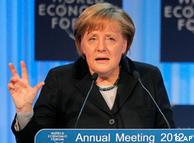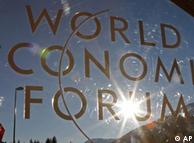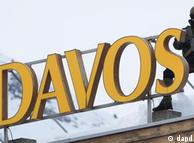ECONOMY | 25.01.2012
In Davos, Merkel urges Europe to become 'more European'
In her keynote address, opening the World Economic Forum in Davos, Chancellor Angela Merkel urged Europe to become "more European" and work together to resolve its festering problems.
Merkel said Europe lacked the political structures to make the common currency, the euro, work properly. Despite recent biting criticism that Germany should shoulder more responsibility in the current debt crisis, Merkel stressed that Berlin was resolved to do what was necessary to save European unity.
Merkel said that the world had not learned from the 2008 financial crisis. Reforms of financial markets have not gone far enough, she said.
The chancellor said Berlin was ready to play its full part in combating the eurozone crisis, but could not promise things it cannot deliver.
Merkel defends Germany's actions
In a group interview with newspapers from Britain, France, Germany, Italy, Poland and Spain, published on Wednesday prior to her Davos address, Merkel insisted that nations at the center of the eurozone debt crisis needed to press ahead with economic reform measures.
"It does not make sense to promise more money, but not tackle the causes of the problem," Merkel said.
At the same time, she again called on other European leaders to agree on a tough set of parameters to form the basis of the planned fiscal pact on budget discipline.
"If you have promised debt reduction and solid public finances a hundred times, then it must also be enforced in the future," Merkel said.
Sharp criticism
The chancellor's remarks followed calls by Italy and the International Monetary Fund for Germany to offer more funds to boost the so-called European Stability Mechanism (ESM). Merkel has ruled out bolstering the permanent euro rescue fund.
Merkel has been sharply criticized by investors, like billionaire George Soros, for not dealing effectively with the euro crisis.
"Germany dictates policies which lead to a spiraling debt with deflationary consequences," Soros said. He accused Germany of making unrealistic demands of less economically successful members of the currency club.
Merkel has rejected as "unfounded" stereotypes about a domineering and dogmatic Germany whose economic strength hinders growth in the rest of Europe. She told news editors that such clichés did not help the cause of European integration.
"There are lazy Germans and hard-working Germans, left-wing Germans and conservative ones. There are those who support competitiveness and those who want redistribution. Germany is just as varied as the rest of Europe. We should bury the old stereotypes," Merkel told the newspapers.
Author: Gregg Benzow (AFP, dpa, Reuters)
Editor: Nancy Isenson
Editor: Nancy Isenson




No comments:
Post a Comment